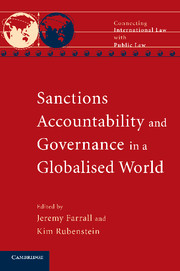Book contents
- Frontmatter
- Contents
- Contributors
- Series editors' preface
- Editors' preface
- Introduction: Filling or falling between the cracks? Law's potential
- PART I Setting down the foundations
- PART II Internationalising public law
- 3 Globalisation and public law: A global administrative law?
- 4 The deliberative deficit: Transparency, access to information and UN sanctions
- 5 Who guards the guardian? Towards regulation of the UN Security Council's Chapter VII powers through dialogue
- 6 Holding the United Nations Security Council accountable for human rights violations through domestic and regional courts: A case of ‘be careful what you wish for’?
- PART III Implementing Security Council sanctions
- PART IV The place of corporations
- PART V The role of lawyers
- PART VI Public law and public policy
- PART VII Parallel case studies
- Concluding remarks
- Bibliography
- Index
4 - The deliberative deficit: Transparency, access to information and UN sanctions
Published online by Cambridge University Press: 05 October 2010
- Frontmatter
- Contents
- Contributors
- Series editors' preface
- Editors' preface
- Introduction: Filling or falling between the cracks? Law's potential
- PART I Setting down the foundations
- PART II Internationalising public law
- 3 Globalisation and public law: A global administrative law?
- 4 The deliberative deficit: Transparency, access to information and UN sanctions
- 5 Who guards the guardian? Towards regulation of the UN Security Council's Chapter VII powers through dialogue
- 6 Holding the United Nations Security Council accountable for human rights violations through domestic and regional courts: A case of ‘be careful what you wish for’?
- PART III Implementing Security Council sanctions
- PART IV The place of corporations
- PART V The role of lawyers
- PART VI Public law and public policy
- PART VII Parallel case studies
- Concluding remarks
- Bibliography
- Index
Summary
Transparency is commonly recognised as a desirable institutional value. It has been touted as a core attribute of good governance. Yet, while the benefits of transparency in institutional decision-making are clear, unqualified transparency may be less obviously desirable in the case of institutions that rely on a measure of confidentiality to achieve their aims. The UN Security Council, for example, has been described as ‘a body in which confidentiality and informality regarding the decision-taking process are part of the business’. Some have attributed the Council's effectiveness to a ‘procedure of confidentiality’, which provides a climate for free-ranging and uninhibited debates, and the achievement of consensus. Even so, this has not diminished the chorus of voices calling upon the Council to ensure greater transparency in its working methods and procedure. The call has been particularly strong in the context of decision-making on UN sanctions. With the increasing move to ‘targeted’ sanctions against particular individuals, groups and products, affected entities have a heightened interest in the reasons behind decision-making in sanctions regimes.
This chapter seeks to provide an adjunct to the political debate by examining the role of legal standards in ensuring greater transparency. If the application of unmitigated transparency can be criticised on justifiable grounds by those who would otherwise recognise the merits of a principle of transparency, determining the reasonable limits of such a principle is of crucial importance.
- Type
- Chapter
- Information
- Publisher: Cambridge University PressPrint publication year: 2009
- 3
- Cited by

